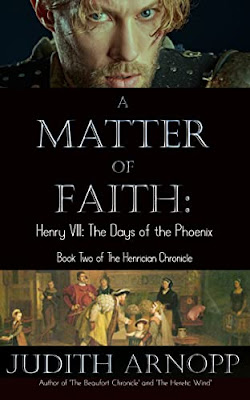5 out of 5 stars
On Amazon (universal link)
On Goodreads
How I discovered this book: have been looking forward to it since reading the previous episode!
In a Nutshell: Henry VIII - the Anne Boleyn and Jane Seymour years
I zipped through this in two days. Judith Arnopp's writing flows with such ease; when starting one of her books, I inevitably look up and wonder how come it's 2 in the morning and I'm already a third of the way through!
In this episode of Henry VIII's life, he has just married Anne Boleyn and is still, after 5 years, obsessively in love with her. His version of love, at least; when she fails to produce a son and heir, and forgets to be her beautiful, charming best after giving birth/experiencing a devastating miscarriage, he begins to inch away. Into the arms of Jane Seymour he falls - this time his 'love' only lasts a year or so, when he begins to see her as dull, frigid and uninteresting, rather than delightfully quiet and biddable. Though she does produce the required prince, so after she dies (a fortnight after the birth), he fancies that he did love her, after all.
The way in which Ms Arnopp has written Henry in this phase of his life is so very clever. The boy who lost his mother at such a young age, always aware that in his father's eyes he would always be the spare, rather than the heir. As can so often happen, childhood insecurity becomes self-absorption in maturity; he searches constantly for confirmation of his popularity, his talents, his virility, his strength and, of course, his desirability. Rarely if ever does he consider the feelings or needs of others; they are of no consequence.
The book is written in the first person, and Henry comes across as childlike at almost all times. When his health and looks are ruined by his own self-indulgence, a ghastly leg injury and the ageing process, when his appeal to his subjects is greatly hampered by his brutal decisions, when those who loved him are no more (at least half of them by his own hand), he kicks out and hurts those around him. The way in which he scarcely mentions some key events was, I thought, so artfully executed; if a circumstance does not affect him directly, so it remains on the shadowy periphery of his orbit. Even the deaths of Robert Aske and his cohorts gain little mention; always Henry can justify his own actions.
This is not a long book and now and again I would have liked a little more detail like, for instance, how he was affected by the death of Thomas More, but, then again, one cannot fail to notice that the most devastating events (such as the murder of Anne and his men) are skimmed over the most quickly of all. As though he cannot even bear to think about them, so pushes them out. Now and again there is insight into his own pain - it was not just Katharine and Anne who lost all those children. Each time, was he sent straight back to the pain of losing his little sister, Elizabeth, as well as his mother? Were the murders of Anne, George, Norris, Brereton, Weston and Smeaton more than he could bear?
This is not just another account of the Boleyn/Seymour years, but a rare insight into the mind of the man who made it all happen. A round of applause, and I can't wait to read the next instalment!





